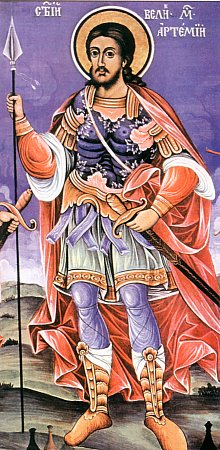
The Holy GreatMartyr Artemios
Commemorated on October 20
The Holy GreatMartyr Artemios was a prominent military leader during the reign of the Equal-to-the-Apostles emperor Constantine the Great (306-337, Comm. 21 May), and later – also of his son and successor Constantius (337-361). Artemios held many awards for distinguished service and courage, and he was appointed viceroy of Egypt. In this official position he did much for spreading and strengthening Christianity in Egypt. The emperor Constantius was succeeded on the throne by Julian the Apostate (361-363). Julian in his desire to restore paganism carried on an implacable struggle with Christianity, sending hundreds to their death.At Antioch he ordered the torture of two bishops unwilling to forsake the Christian faith. During this time Saint Artemios arrived in the city and publicly denounced Julian for his impiety. The enraged Julian subjected the saint to terrible tortures, after which they threw the Great-martyr Artemios into prison. During the time of prayer which the saint offered to the Lord, Christ Himself appeared to him surrounded by angels and said: "Take courage, Artemios! I am with thee and wilt preserve thee from every hurt which the tormentors may inflict upon thee, and already have I preared thy crown of glory. Wherefore as thou hast confessed Me before the people on earth, so also shalt I confess thee before Mine Heavenly Father. Therefore, take courage and rejoice, – thou shalt be with Me in Mine Kingdom". Hearing this of the Lord Himself, Artemios rejoiced and began fervently to offer up glory and thanksgiving to Him.

On
the following day Julian demanded that the Great-martyr Artemios honour the
pagan gods. Meeting with steadfast refusal, the emperor resorted to torture.
The saint endured all without a single moan. The saint then predicted to Julian
that he would soon receive just recompense for the evil done by him to Christians.
Julian became furious and resorted to even more fiercesome tortures, but they
did not break the will of the saint, and finally the Great-martyr Artemios was
beheaded (+ 362).
His
remains were buried by Christians.
And
after the death of the holy Great-martyr Artemios, his prophecy about the
impending perishing of Julian the Apostate came true.
Julian
left Antioch for a war with the Persians. Near the Persian city of Ctesiphon he
came upon an elderly Persian, who agreed to betray his countrymen and guide
Julian's army. But the old man deceived Julian and led his army into an
impassable place in the Karmanite wilderness, where there was neither food nor
water. Worn down by hunger and thirst, the Graeco-Roman army of Julian had to
do battle against fresh Persian forces.
Divine
retribution caught up here with Julian the Apostate. At the time of battle he
was mortally wounded by an unseen hand and an unseen weapon. Julian groaned
deeply, and dying, he said: "Thou hast conquered, Gallileian!" After
the perishing of the apostate-emperor, the relics of the Great-martyr Artemios
were transferred with honour from Antioch to Constantinople.
© 1996-2001 by translator Fr. S. Janos.